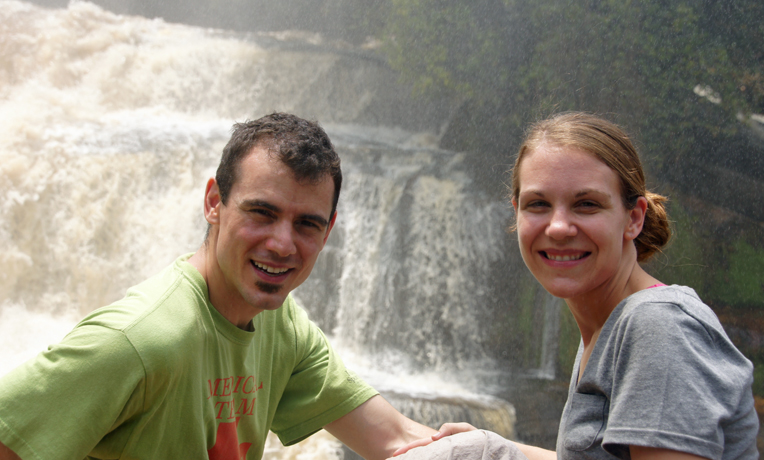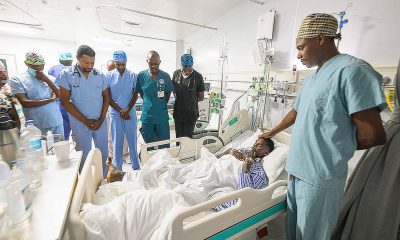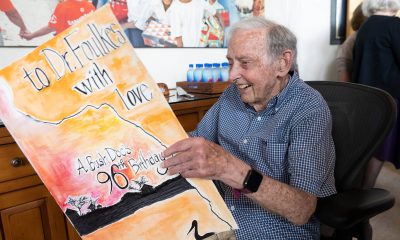A life-threatening ski accident left a young physician with a paralyzed arm and his future in medicine unclear.
The following story is from the latest edition of On Call, the Samaritan’s Purse publication for doctors who serve through World Medical Mission and those interested in medical missions.
Dr. Erik Scharrer was six months into his residency as an emergency medicine physician when a potentially fatal ski accident left his left arm paralyzed, casting a shadow over his future in medicine.
 “The first couple days after the crash, I think we were operating under shock mode,” Kara Scharrer posted on their family blog. “There is a possibility that the feeling and movement in his arm will never come back. After the worry and tears, I reminded Erik that we don’t know anything for sure, other than God takes care of us and has a plan.”
“The first couple days after the crash, I think we were operating under shock mode,” Kara Scharrer posted on their family blog. “There is a possibility that the feeling and movement in his arm will never come back. After the worry and tears, I reminded Erik that we don’t know anything for sure, other than God takes care of us and has a plan.”
The Scharrers tackled each new day by faith, not knowing what God had in store.
“Two years ago, we were unsure if Erik would ever be able to practice medicine in the same way again,” Kara said. “God taught us patience, trust, and healing. He taught us His timing, His will, and His answers. Erik’s recovery and return to work a year ago was such a blessing and a gift. Now it’s time to use this gift that God has granted him and help others who aren’t so fortunate.”
As God’s plan unfolded, Erik and Kara found themselves traveling to the Republic of Congo to serve for 18 days at Pioneer Mission Hospital through World Medical Mission, the medical arm of Samaritan’s Purse. It didn’t take long for them to see why the Holy Spirit drew them to Africa.

Dr. Scharrer assists with a surgery.
Erik and Kara were welcomed by the hospital staff. Kara joined the physicians on rounds and served as a childbirth attendant, while Erik treated patients and assisted with surgeries.
“Many people needed intense medical care long before they arrived at the hospital,” Erik said. “To see such tremendous need and be part of turning life-threatening situations around was a true blessing. It was rewarding to serve there, ministering to patients and sharing the Gospel.”
The Scharrers ventured further into new territories one Sunday morning by making a “house call” to a group of Pygmies who live in the nearby forests. The Pygmies welcomed them to their camp.
“They were very proud to take Erik and me on a jungle hike to show us how they survive in the forest,” Kara said. “They taught us all about the plants and what they use their natural medicines for. We drank from vines, ate cocoa nuts (the kind they make chocolate from), and even chewed on some bark from an African tree!”

The Scharrers made a Sunday house call to a Pygmy village. They returned to the hospital with one patient and a carload of 37 of her family and friends who wanted to attend church.
When Kara and Erik returned to the hospital, they transported one sick woman and a carload of 37 Pygmies who wanted to attend church.
The 18-day journey to Pioneer Mission Hospital drew Erik and Kara into deep discussions about involvement in long-term medical missions in Africa. When they brought their children into the conversation, the insights were priceless.
Their 3-year-old, Klaasen, was determined to look for dinosaurs in Africa. Better yet, he wanted to live with them. “I really just want to live in a dinosaur home,” he said.
Kara fielded questions about looking for sharks as the family flew over the ocean, sleeping in trees under mosquito nets, and sneaking the family dog, Barkley, on the plane. But the conversation soon turned to more spiritual things.
“I would love to teach people about God there,” said 7-year-old Maida.

The Scharrer children were excited about the possibility of going to Africa. (L to R) Skogen, Torsten, Maida, and Klaasen.
“Teach them a lesson in English!” her 4-year-old brother, Skogen, insisted.
“No, I would learn all the words in Africa and I would preach in the church and tell them about God,” Maida explained. “I would tell them that God can do everything and you can pray, and sometimes you’ll get something better, or sometimes He’ll say ‘later,’ or He’ll say ‘sorry, no.’ Like, something like that. This would make me happy, excited, and really excited that more people can learn about God.”
Even the dinosaur hunter, Klaasen, understood the importance of sharing the Gospel. “I would just talk about God and pray with them. I would tell them about God, and Jesus sitting on the cross, and how He died for our fringe [sins].”
As the Scharrers pray about their future involvement in medical missions, a passage from Romans has taken a special place on their family blog: “As the Scripture says, ‘Everyone who calls out to the Lord for help will be saved.’ But how can they call to him for help if they have not believed? And how can they believe if they have not heard the message? And how can they hear if the message is not proclaimed? And how can the message be proclaimed if the messengers are not sent out? As the Scripture says, ‘How wonderful is the coming of the messengers who bring good news!’”—Romans 10:13-15.






